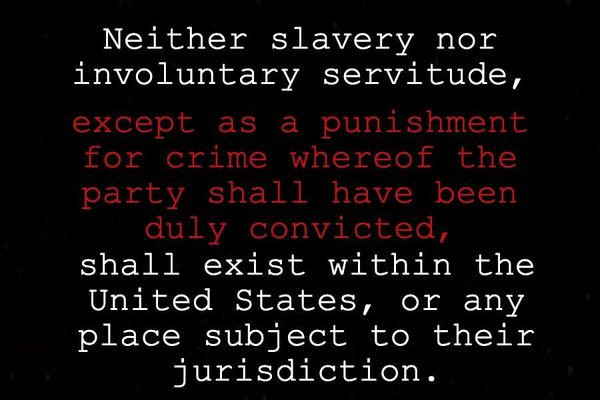Slavery Banned! (In Some States, Anyway)
Alabama and Tennessee are two of them though, and that's a big deal.
In this, the year 2022, 188 years after slavery was "abolished," five states voted on whether or not to amend their constitutions to bar the practice of involuntary servitude as punishment for a crime.
Vermont voted yes. That was predictable.
Oregon voted yes, in an unsettlingly narrow 54-45 victory.
Tennessee voted yes, which is a very big deal given the state of incarceration in Tennessee.
Alabama voted yes, which is an even bigger deal — they were the the last state to end convict lease programs (slavery under another name) in 1928 and they have the most overcrowded prisons in the nation.
Louisiana voted no ... but that's actually not a bad thing. Let me explain!
The actual language in the bill was very bad — so bad that it actually left room for one to argue that the state was legalizing slavery in general rather than outlawing it in prisons.
The measure would have added the text "Slavery and involuntary servitude are prohibited, (but this) does not apply to the otherwise lawful administration of criminal justice" to the state constitution. Prisoner rights groups as well as Democrats who had previously lobbied for such a bill argued against passing it with this language and encouraged people to hold out for another year in order to get an amendment with clearer language.
It is unfortunate, however, as Louisiana has some of the worst prisons in the entire world, and they just recently decided to start sending juvenile offenders to those prisons. The state just sent several teenagers to the notorious Angola Prison and hopes to send more.
Part of the reason this is so very important right now is that allowing states to benefit from free labor gives them an incentive to keep people behind bars when they don't really need to be there. That is not something we want, as our prisons are dangerously overcrowded, which makes them incredibly unsafe. Inmates in overcrowded prisons are more likely to be murdered and/or sexually assaulted and far, far less likely to have access to rehabilitative programs — including actually learning job skills they could actually use in the outside world.
That's bad if you care about prisoners and it's bad if you don't care about prisoners but you do care about yourself and your own personal safety. Most prisoners leave eventually and a system that renders them worse and less likely to be able to find proper employment when they get out is quite obviously not a system that keeps anyone safe.
The truly incredible thing is that these measures passed at a time when Republicans have been pushing a narrative that crime is out of control and only rightwing remedies (that they never seem to actually explain) can stop it. People, especially in these red states, had that rattling around in their heads and still voted for these measures. That's something that should give us all hope. As much as voters will say in polls that the Left is going "too far!" or that they "trust" Republicans more on things like crime and the economy — once things actually get specific, once they are broken down on an issue by issue basis, they actually lean left. In fact, they frequently lean further left than it is traditionally considered wise for Democrats to go.
This is especially true in the area of criminal justice. A 2017 survey conducted by Benenson Strategy Group for the ACLU found that:
91 percent of Americans say that the criminal justice system has problems that need fixing.
71 percent say it is important to reduce the prison population in America, including 87 percent of Democrats, 67 percent of Independents, and 57 percent of Republicans — including 52 percent of Trump voters.
2 in 3 Americans (68 percent) would be more likely to vote for an elected official if the candidate supported reducing the prison population and using the savings to reinvest in drug treatment and mental health programs, including 65 percent of Trump voters.
72 percent of Americans would be more likely to vote for an elected official who supports eliminating mandatory minimum laws.
84 percent of Americans believe that people with mental health disabilities belong in mental health programs instead of prison.
71 percent of Americans agree that incarceration is often counterproductive to public safety, since “sending someone to prison for a long sentence increases the chances that he or she will commit another crime when they get out because prison doesn’t do a good job of rehabilitating problems like drug addiction and mental illness.” This includes 68 percent of Republicans and 65 percent of Trump voters.
The majority of Americans recognize racial bias in the criminal justice system — only one in three agree that Black people are treated fairly by the criminal justice system.
A more recent poll conducted by Gallup in 2020 found that "more Americans prefer putting money and effort into addressing social and economic problems such as drug addiction, homelessness and mental health (63%) rather than putting money and effort into strengthening law enforcement (34%)."
It would be great to enact all of these great reforms that Americans so clearly want, but for now, getting rid of literal slavery in a few states is a pretty big win.
Do your Amazon shopping through this link, because reasons .
Wonkette is independent and fully funded by readers like you. Click below to tip us!




Fuuuuuuuck those counties! Good riddance to bad rubbish
Corncentration camps?